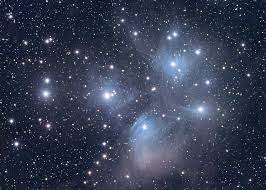Surah Al-Burooj (The Mansions of the Stars)
Surah Al-Burooj, the 85th chapter of the Quran, is a Meccan Surah that deals with themes of divine justice, the fate of the believers and disbelievers, and the grandeur of the celestial realm. The Surah’s name, “Al-Burooj,” translates to “The Mansions of the Stars” or “The Constellations,” and it contains verses that evoke the majesty of the cosmos and highlight the signs of Allah’s creation. This Surah provides a rich tapestry for contemplation, linking the spiritual with the cosmological.
Themes and Key Verses
1. The Oath by the Sky and the Stars:
Verse 1: “By the sky containing great stars.”
- This opening verse swears by the sky and its constellations or great stars, drawing attention to the vastness and splendor of the heavens. The Quran frequently uses oaths by elements of the natural world to emphasize the importance and truth of the ensuing message. In this case, the invocation of the stars serves to underscore the grandeur of the cosmos and the power of its Creator.
2. The Story of the People of the Ditch (Ashab al-Ukhdood):
Verses 4-8: “Cursed were the companions of the trench. [Containing] the fire full of fuel. When they were sitting near it. And they, to what they were doing against the believers, were witnesses. And they resented them not except because they believed in Allah, the Exalted in Might, the Praiseworthy,”
- These verses recount the tragic tale of the “People of the Ditch,” who persecuted and burned believers alive simply because of their faith in Allah. This story serves as a powerful reminder of the trials faced by early Muslims and the steadfastness required in the face of oppression. It highlights the theme of divine justice, as the oppressors are ultimately cursed for their actions.
3. The Promise of Divine Justice:
Verses 10-11: “Indeed, those who have tortured the believing men and believing women and then have not repented will have the punishment of Hell, and they will have the punishment of the Burning Fire. Indeed, those who have believed and done righteous deeds will have gardens beneath which rivers flow. That is the great attainment.”
- These verses promise severe punishment for those who torture and oppress believers while offering the hope of eternal paradise for the faithful who perform righteous deeds. This juxtaposition of divine retribution and reward reinforces the Quranic theme of moral accountability and the ultimate triumph of justice.
4. The Power of Allah in Creation:
Verse 12: “Indeed, the vengeance of your Lord is severe.”
Verse 13: “Indeed, it is He who originates [creation] and repeats.”
- These verses emphasize the omnipotence of Allah, who not only enacts severe vengeance upon wrongdoers but also possesses the power to create and recreate. This notion of repeated creation can be linked to the cycles observed in the universe, such as the life cycles of stars and the expansion and contraction theories of the cosmos.
5. The Immutable Nature of the Divine Will:
Verse 16: “A Glorious Quran.”
Verse 17: “On a Preserved Slate.”
- These concluding verses assert the divine origin and preservation of the Quran. The concept of a “Preserved Slate” (al-Lawh al-Mahfuz) denotes the eternal and unchangeable nature of the divine decree. This can be interpreted as a metaphor for the fundamental laws of the universe, which remain constant and govern all creation.
Connections to Cosmology
1. Celestial Grandeur and the Invitation to Reflect:
The oath by the sky and the stars in the opening verse encourages believers to contemplate the vastness and beauty of the cosmos. This reflection can lead to a greater appreciation of the divine power and wisdom behind the creation of the universe. In modern times, the study of astronomy and cosmology allows us to explore the intricacies of the stars and galaxies, further enhancing our understanding of the divine signs mentioned in the Quran.
2. The Cycle of Creation:
The verse that mentions Allah’s ability to originate and repeat creation can be seen as an allusion to the cyclical nature of the universe. In contemporary cosmology, this could relate to theories such as the Big Bang and the potential cyclic model of the universe, where the cosmos undergoes periods of expansion and contraction. The Quran’s reference to repeated creation aligns with these scientific concepts, suggesting a deeper layer of meaning in the text.
3. The Preservation of Divine Order:
The concept of the “Preserved Slate” signifies the immutable nature of divine will and decree. This idea resonates with the scientific principle that the fundamental laws of physics are constant throughout the universe. Just as the Quran is seen as a preserved and unchanging source of guidance, the laws of nature remain consistent and govern the behavior of all matter and energy in the cosmos.
4. Moral and Cosmic Justice:
The Surah’s emphasis on divine justice reflects the orderly and balanced nature of the universe. Just as moral transgressions are met with appropriate consequences, the physical universe operates according to precise laws and principles. This parallel between moral and cosmic order highlights the Quranic view of a universe that is both just and meticulously regulated.
Conclusion
Surah Al-Burooj offers profound insights into the nature of the cosmos and the divine order governing it. By invoking the grandeur of the stars and the sky, the Surah invites believers to reflect on the signs of Allah’s creation and recognize the power and wisdom behind it. The themes of divine justice, the cycle of creation, and the preservation of the divine will resonate with modern cosmological concepts, bridging the gap between spiritual teachings and scientific understanding. Through contemplation of these verses, one can gain a deeper appreciation of the Quran’s guidance and its relevance to contemporary explorations of the universe.










One thought on “Surah Al-Burooj (The Mansions of the Stars) in Relation to Cosmology”